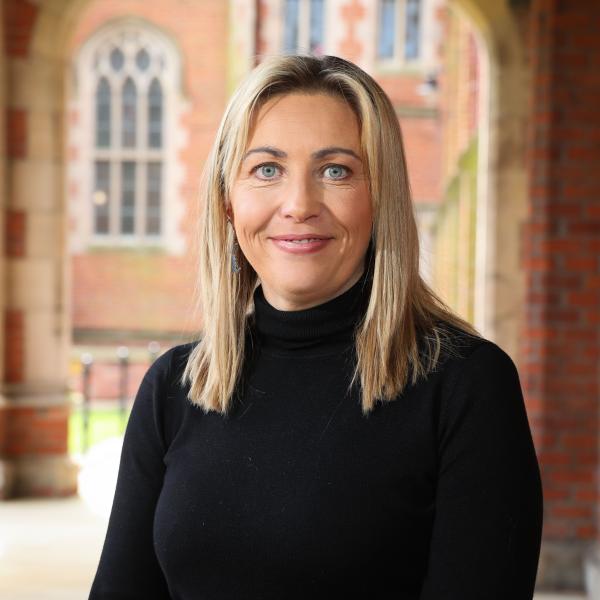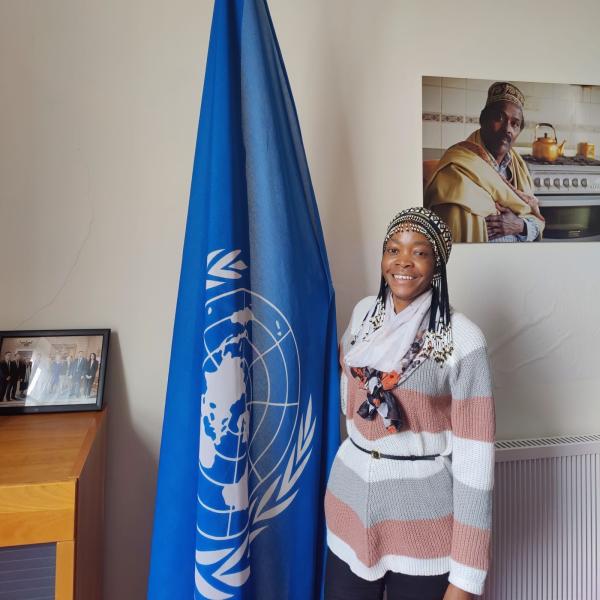Overview
Are you motivated by a commitment to advocacy, solidarity, and social justice? The Master of Arts in Refugee Integration offers you a unique opportunity to engage with the critical challenges facing our world today. As we face a polycrisis of global proportions—from climate-induced displacement to growing social inequalities—this programme, offered by the School of Applied Language and Intercultural Studies, prepares you to be a leader in addressing these urgent issues, while opening doors to a wide variety of career paths across advocacy, policy, and humanitarian sectors.
Why DCU
DCU People

Hi, I am Fiona Murphy and I'm an anthropologist based in SALIS, DCU with specialisms in indigenous politics and movements, refugees and mobility studies and sustainability studies.
Read more about Fiona Murphy

I chose the MA in Refugee Integration Studies because of my strong commitment to social justice and my desire to contribute to the well-being of marginalised communities.
Read more about Elsadig Ishag

I chose the MA in Refugee Integration Studies as I am a refugee and have experience working with refugees and asylum seekers. I decided to pursue an MA in Refugee Integration Studies.
Read more about Siphiwe Moyo
Careers & Further Options
Careers
Graduates of this programme can anticipate a wide array of employment opportunities in various sectors, including:
- Non-Governmental Organisations (NGOs), both domestically and internationally.
- Reception and integration organisations, such as the Reception and Integration Agency, and Direct Provision Centers.
- Local government bodies are located in areas designated for refugee reception.
- Local and national organisations and workplaces, such as hospitals, schools, and multicultural workplaces, they can contribute to policy development, strategy formulation, and implementation.
- International organisations like the UNHCR, Red Cross, Médecins sans Frontières, and others are dedicated to ensuring the well-being and care of refugees and migrants.
"DCU graduates are highly sought after by employers. Our Graduates work in environments ranging from large multinationals to SMEs, family businesses and start-ups across every sector.
DCU Careers Service has a number of learning and development initiatives in place for our students, giving them the skills they need for a successful career path."
Entry Requirements
For admission to the MA in Refugee Integration programme, successful applicants will have:
A degree at the level of an Irish or UK Honours undergraduate degree (H2.2 or above) or equivalent
Applicants with appropriate combinations of professional qualifications and experience may also be considered. This includes discipline-specific knowledge and know-how; transferable skills; basic research competency; personal effectiveness.
Recognition of Prior Learning (RPL) applicants are required to submit a cover letter along with their application under the Transcripts section of the portal, affirming their intent to apply for RPL. For more information on RPL see here.
International candidates who are non-native speakers of English must satisfy the University of their competency in the English language.
Programme Structure
As a full-time student, here's how your programme will be structured:
- In the first semester, you'll have three core classes, and there's also a research methodology class that lasts the whole year.
- In the second semester, you'll get to pick three classes from a list of options.
- You'll be required to write a 12,000-word dissertation, which is due in September.
Classes for this programme are scheduled in the evening, typically starting at 4 pm or later. Each class is taught in a seminar style. Additionally, you'll have the opportunity to hear from guest speakers who work with NGOs and have experience with people in refugee-like situations.
Please note that some of the optional classes in the second semester, offered by the School of Law and Government, may have earlier time slots in the day.
This programme has several goals:
- Connect theory, policy, and practical application.
- Provide top-notch academic education and training on the topic of refugee integration.
- Collaborate closely with non-governmental organisations (NGOs) and professionals working in this field.
- Conduct research on the challenges related to integration and the well-being of people in refugee-like situations.
- Address the needs of both newly arrived populations and the communities they are joining, with the aim of ensuring a smooth and harmonious integration process.
- Understand the Challenges of Forced Migration: This programme offers you the critical tools to grasp the complexities surrounding the social inclusion of refugees and those seeking international protection. You will explore the challenges that must be addressed to create inclusive and welcoming societies, ensuring both the newcomers and host communities thrive.
- Develop Skills to Respond to Global Displacement: Gain the knowledge and practical skills needed to effectively respond to the forced displacement of people, including climate displacement, in ways that support both those displaced and the societies they join. You’ll be prepared to tackle real-world challenges, ensuring positive outcomes for all.
- Advocate for Change: Build expertise in advocacy and solidarity, equipping you to work for non-governmental organisations (NGOs), grassroots movements, and advocacy groups. This programme empowers you to become a voice for those affected by forced migration, driving meaningful social change on behalf of vulnerable populations.
- Crisis Management and Beyond: Expand your capabilities in crisis management, preparing you to work in challenging environments that require strategic responses to forced migration and global emergencies. These skills are crucial for professionals navigating today’s interconnected global crises.
- Shape Policy and Advocacy Campaigns: Learn to create effective policy documents and design advocacy campaigns at both the local and national levels. With these skills, you’ll be able to influence change and contribute to the development of inclusive policies that address forced migration and social justice issues head-on.
- Shape a Career in Advocacy and Social Justice: This programme equips you with the expertise needed to advocate for the rights of displaced people and work towards meaningful social inclusion. Whether you aim to work with international organisations, NGOs, government bodies or grassroots movements, you will gain the critical skills to lead efforts that prioritise dignity, rights, and inclusion. From policy-making and refugee protection to campaigns for social justice, this degree provides the foundation for diverse and impactful career paths.
- Lead in a World of Complex Global Challenges: The reality of forced migration is intertwined with a polycrisis—climate change, geopolitical instability and economic disparity. This programme allows you to critically examine these interrelated crises and how they drive displacement. You will learn how to advocate for policies that promote social inclusion and address the growing issue of forced displacement, ensuring you are equipped to respond to future global challenges with confidence and insight.
- Flexible Hybrid Learning for Your Career: With the option to study part-time over two years and in a hybrid format that combines in-person and online learning, this programme is designed to fit into your life, no matter where your career currently stands. Whether you’re already working in the field of social justice or transitioning into it, the flexibility of this course allows you to pursue your passion while managing your professional and personal responsibilities.
- Interdisciplinary Approach for Comprehensive Understanding: This programme goes beyond the conventional study of forced migration. It offers an interdisciplinary lens, drawing from the fields of law, policy, healthcare, education, crisis management and human rights to provide a thorough understanding of the complex dynamics of forced migration and social inclusion. This diverse approach ensures that you’ll be prepared for a range of career tracks, from humanitarian work and social advocacy to public policy and research.
- Prepare for Tomorrow’s Challenges: In a world where the scale of forced migration continues to grow, driven by climate crises, conflict, and inequality, this programme equips you to anticipate and address the global challenges of tomorrow. Through real-world case studies and theoretical exploration, you’ll develop the critical thinking and problem-solving skills needed to respond to future crises with compassion, insight, and practical solutions.
- Champion Social Inclusion and Solidarity: This course challenges you to think deeply about how societies can foster inclusion and solidarity in the face of growing inequalities and displacement. You’ll engage with pressing issues such as racism, xenophobia and exclusion, exploring how to build more inclusive, just and resilient societies.
Dublin City University (DCU) is proud to be Ireland’s first designated University of Sanctuary, a recognition of our commitment to supporting asylum seekers and refugees. As a student in the MA in Refugee Integration programme, you’ll have the unique opportunity to engage with the Irish Refugee Integration Network (IRIN), a network we run to support and integrate refugees in Ireland. Through IRIN, you can gain hands-on experience by volunteering, working directly with refugees and asylum seekers, and contributing to their successful social inclusion.
This real-world experience not only deepens your understanding of forced migration and social justice issues but also provides you with invaluable practical skills that can enhance your career prospects. You’ll have the chance to collaborate with community leaders, NGOs and advocacy groups, putting theory into practice and making a tangible difference in the lives of those affected by forced displacement.
By choosing DCU, you are not just advancing your education; you are becoming part of a vibrant community dedicated to social justice, advocacy, and solidarity. The combination of academic learning, hands-on experience and interdisciplinary exploration will prepare you for a career that truly matters. Join us in tackling the global challenges of today and tomorrow, and help create a more inclusive, fair and sustainable world.
Fees and Funding
Fees
How To Apply
To apply for this programme:
All Applicants must apply through DCU's Student Application Portal which is available here. Here's a quick step by step guide if you need help with your application:
• Provide Academic Transcripts for each and every year of study with English translation, if applicable.
• If applicable, provide evidence of competence in the English language as per DCU entry requirements. Please see link http://www.dcu.ie/registry/english.shtml
Application Deadlines
Applications will be accepted on a rolling basis until the programme is full or until the following dates:
- Closing date for non EU applicants is 1st July 2025
- Closing date for EU applicants is 30th August 2025
Note applicants who require a study visa for the purposes of studying at DCU, are advised to apply as early as possible.
If you are a non EU student and require a study visa, you are not eligible to apply for part-time programmes as study visas are only granted for full-time programmes.
All entry requirements should be met before the commencement of the programme.
Application Queries
For EU applicant queries, please visit https://www.dcu.ie/registry/eu-postgraduate-taught-admissions or email postgraduateadmissions@dcu.ie
For non EU applicant queries, please visit https://www.dcu.ie/registry/international-admissions-undergraduate-and-postgraduate or email internationaladmissions@dcu.ie
Commencement of Programme
The programme commences in September 2025
Life On Campus
At DCU, our students can expect a unique campus experience. We are known for our excellent teaching and learning facilities, our active clubs and societies, and our great social and sporting facilities. All this makes DCU an exciting place to be.
DCU has three academic campuses; Glasnevin, St. Patrick’s and All Hallows (both in Drumcondra), all close to Dublin City centre.
They can be reached by public transport, Dublin Bus and Bus Éireann, with our Drumcondra campuses a ten minute walk from Drumcondra Train Station. Glasnevin is a 20 minute walk from St Patrick’s and All Hallows. They are also linked by Dublin Bus.
Each campus has a library (O’Reilly, Cregan and Woodlock Hall), study spaces, restaurants, and on-campus residencies. There are sports facilities on Glasnevin and St. Patrick’s, and there is a dedicated sports campus, St Claire’s, located near Glasnevin on the Ballymun Road.
DCU’s 19,000 students have access to exceptional teaching and learning facilities across our three academic campuses.
These include modern learning theatres, research centres, a new media and TV studio, radio/podcast studios, computer suites and advanced labs in the areas of Languages, Engineering, Physics, Chemistry and Biotechnology, as well as a Sports Performance centre and a training hospital ward. In 2021, we opened our first virtual reality ‘Leadership Lab’, which is located in our Business School.
We continue to improve and update our facilities. For example, construction of a new world-class STEM facility is underway on the Glasnevin campus. With capacity for an extra 3,000 STEM students, this facility will advance DCU’s international reputation for excellence in science and health, computing and engineering disciplines.
Studying in DCU isn’t just about course work. The university is rich in student life and activities.
There are more than 140 clubs and societies for students in DCU, with ‘Clubs & Socs’ days taking place on both the Glasnevin and Drumcondra campuses at the start of the academic year. They span everything from rugby to rock climbing, anime to jazz.
For many students, sport is an important part of the DCU experience. DCU’s Sports Complex boasts a 25 metre swimming pool, fitness centre gym, all-weather pitches and squash courts, as well as soccer, GAA and rugby pitches. DCU Dóchas Éireann, the university’s GAA club, is the largest third level Gaelic Games club in the country. Meanwhile, DCU Athletics has been Ireland’s highest achieving university club for many years. And DCU has dozens of other clubs to get involved in, from Archery to Weightlifting.
The Glasnevin campus is home to our purpose built, state-of-the-art student centre, The U, which serves the needs of a rapidly growing student body. Here, you will find the Student Leadership and Lifeskills Centre, performing arts and cultural spaces for students and the wider community, and the Entrepreneurship and Innovation Hub. Also located on our Glasnevin campus is The Helix, our renowned performing arts centre.
On our St Patrick’s campus, we have the Java Student Hub, a vibrant, warm and welcoming space where students can meet for coffee, play music, use the projector to watch events, or just relax. The walls of the Java Hub were designed based on the cultural history of St Patrick’s Campus, including the special references to the notable sporting history and history of the arts.
We have a number of academic, professional and social supports for students.
Student Advice & Learning Skills Centre - Offers a wide range of supports and services to students and advice
The Writing Centre - drop-in writing workshops for students through the academic year
Maths Learning Centre - provides maths support for students of all ability levels with maths modules
Student Learning - facilitate the transition from passive to active learning for students at DCU, by teaching study skills, nurturing critical thinking and building student confidence.
Careers work with students to help them on their professional journey into graduate employment.
Our student support team offers a comprehensive support programme, helping students make that all important transition into university life and focusing on building confidence and skills which are key to success at third level.

DCU Glasnevin Campus
FAQs
Is DCU all one campus?
DCU is a multi campus university - the Glasnevin, St Patrick's and All Hallows campuses. The St Patrick's campus is where the Education courses are taught and some of the subjects from the BA Joint Honours degree. There is a 20-25 minute walk between the campuses but there are buses and bikes available to go between them also.
Click here to see maps of all of our campuses
If I'm studying on the St Patrick's campus, can I use the library and sports centre on the Glasnevin campus?
Yes, all facilities such as sports and accommodation are open for all DCU students to avail of.
Are there libraries in DCU and if they have wifi and work stations?
We have a brand new state of the art four floor library on our St. Patrick's Campus which complements the existing library on the Glasnevin campus. There is free wifi, work stations as well as desktop computers.
Does DCU provide accommodation?
DCU does have on-campus accommodation for undergraduate and postgraduate students, and you can find out more and apply via the Accommodation Office webpage.







